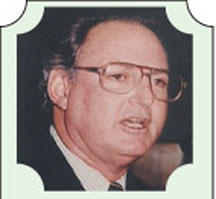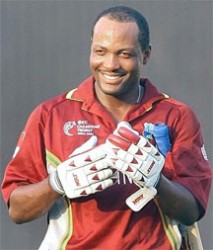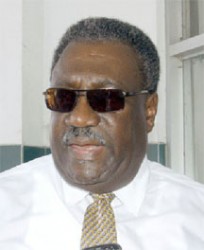West Indies cricket has repeatedly endured horrific times over the past two decades.
None has been more ruinous than the latest strife, on and off the field that has engulfed the most recent trial, the back-to-back tour of India and New Zealand, now mercifully drawing to its end.
The results have been dreadful enough – defeat in both Tests in India by an innings inside three days, in one of the three in New Zealand by a similar margin, another by eight wickets just after lunch on the fourth day. The solitary draw was as much due to the weather as their dogged second innings revival.
These were compounded by the International Cricket Council’s suspension of the one wicket-taking bowler, Shane Shillingford,

for the second time because of his illegal action.
A solitary ODI victory in India was little consolation; last Thursday’s in the first of five in New Zealand was compromised by Marlon Samuels’ wrist injury that ended his involvement, another key player to add to absentee list of Chris Gayle, Kemar Roach and Keiron Pollard, all unfit.
Even more disturbing was the internal discord revealed in the comments by the two captains on tour, by the coach and by the manager.
Friday’s withdrawal from the tour of Darren Bravo, the established No.3, “for personal reasons” added to the intrigue although it would have to be extremely urgent for him to quit at a time when his brother is captain.
Nothing so undermines any organization, more especially a sporting team losing heavily in a distant land, than disharmony.
It was a charge leveled by Dwayne Bravo once he was in New Zealand to take over from Darren Sammy as captain of the ODI team, with Test skipper Sammy now under him.
“Before we played the game, I really stressed on unity as the team was lacking in that lately and hence the reason why we have been playing so poorly,” he said.
Whether intended or not, it was an indictment of the leadership of Sammy, head coach Ottis Gibson and team manager Richie Richardson.


It also amounted to a dismissal of the relevance of the laid-back, expensive week-long “Elite Team Tour” in Florida prior to departure for India that board president Dave Cameron saw as an exercise aimed at creating “a culture of unity, winning and overall success”. Certainly Bravo observed no “culture of unity” as a result.
Before Bravo’s comments, Richardson spoke of indiscipline among the players, as manager surely a matter for which he is responsible, while Sammy and Gibson were at odds over what the repercussions from the overall debacle would be.
In a wide ranging interview on New Zealand radio, Richardson declined to blame the players for everything.
“You have to blame the system,” he said. “If people are allowed to do certain things and get away with it then, you can’t blame them. It’s tough for me; that’s not what I’m accustomed to.”
He spelt out what he was accustomed to during his years on one of the most committed, disciplined West Indies team in the 1980s.
“As soon as you get on the [bus] you need to be ready,” he said. “The opposition needs to know you’re serious and ready for business. You put on your game face and you’re ready for action, ready for business, ready to work, ready to go to war.”
It bothered him “when you see guys hang around the changing room at the ground, doing nothing, like they’re still back at the hotel room.”
It was the authority he commands as a former West Indies captain with 86 Tests to his name that presumably influenced the WICB to appoint him manager to deal with such indifference. Instead, he chose to simply blame the system.
The most pertinent comment out of the whole sorry mess was Sammy’s “we cannot continue like this.” It is a no-brainer.
“There are tough decisions to be made by the coach and the director of cricket (Richard Pybus),” he acknowledged. “Some careers are on the line, could be mine as well, you never know.”
As coach, Gibson’s position is clearly as tenuous as Sammy’s; he sees it somewhat differently.
“When you’ve just lost a series, and the way we’ve lost, emotions run high and people start talking about careers being on the line and it’s a bit premature,” he told the media after the third Test defeat in Hamilton. “We can get home, let the dust settle and assess where we are. We can come up with a plan, but also decide who the right personnel are.”
In the end, it is up to the selection panel to decide on the “right personnel”; it is by no means premature for the present trio to be replaced.
Their complacency after four years was palpable in their decision to pick the identical squad for New Zealand as was thrashed in India. Chadwick Walton, in the redundant role of reserve wicket-keeper, has not played a Test or an ODI in either, Sheldon Cottrell was not called on in the three Tests in New Zealand, Shannon Gabriel in one.
Chairman Clyde Butts and Robert Haynes are in New Zealand where they can observe the contrasting conditions and opposition in the two countries. Unfortunately, it’s too late.
The ramifications from a similarly disastrous tour of New Zealand 13 years ago may be instructive at this time.
The West Indies were then beaten in both Tests, by nine wickets in four days in the first (after ending the first day 282 for one) and by an innings in four days in the second; they also lost all five ODIs.
On return to the Caribbean, Brian Lara resigned as captain and took a complete break from the game, stating that “after two years, the moderate success and devastating failure that has engulfed West Indies cricket has brought me to the realization that there is need for me to withdraw from my present leadership position”.
He was replaced by Jimmy Adams for the home series against Pakistan; the venerable Clive Lloyd, disenchanted with limitations on his role, quit as manager, a position that went to Ricky Skerritt; Sir Viv Richards, then interim coach, was supplanted by Roger Harper; Dennis Waight, the admired, long-serving trainer/physio, retired after more than 20 years.
“These are traumatic times for the West Indies,” Lloyd said at the time. “There are a lot of things wrong at the moment.”
Not much has changed in the interim. They hardly will now but, as Sammy observes, “we cannot continue like this.”






